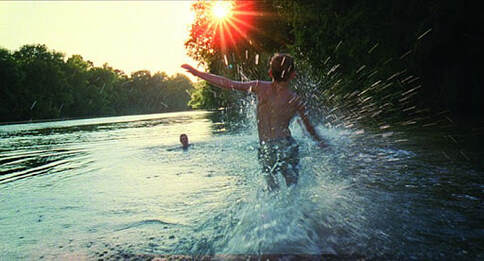B+ | Two friends take up residence in a house that one believes was built by his grandfather. Directed by Joe Talbot Starring Jimmie Fails and Jonathan Majors Review by Jon Kissel |

Fails, full of earnestness and a vulnerability in opposition to his similarly aged peers, proves an able guide through a changing landscape. He’s part jester and part prophet, given to silliness and seriousness within the same line reading. That mixture of absurdity and melancholy plays especially well when the film is observing the city’s changing character. Fails can sit on a bus bench next to a nudist and not think anything of it, in direct contrast to the hooting bros who ride by on pub crawl cable car. The film’s various colorful characters, of which Fails and Mont are only two, are all on the outside, outpriced inhabitants who wouldn’t jeer each other’s eccentricities. This was once a unique place, but it’s now being flooded with money and the flattening character that money brings. If Fails can’t keep the house, the next owner might not be so indulgent of an unrequested handyman who pops up at random intervals, especially not if they fill it with AirBnB customers every weekend.
There are few lower-hanging fruits than invasive tech bros, but Last Black Man isn’t a righteous satire punching up at deserved, but easy, targets. The bulletproof cinematography by Adam Newport-Berra within the house and on the landscape speaks to how valuable time in the city is, and provides stakes to the mental gymnastics that various parties perform to justify their existence in it. For the bros and the realtors, as personified by Finn Wittrock’s Clayton Newsom (little on-the-nose writing there), there’s a willful blindness and an insistence on white benevolence, like the squeezing of anyone less than the ultra-rich is a force of nature instead of a policy outcome. Delusion extends to Fails, whose American dream has become a mirage wherein he could never do enough maintenance or handy work to get anywhere near the home he fancies as his. The vital support work done by people within San Francisco relegates them to the regions where fish with too many eyes flop on poison beaches. The origin story of Fails’ family, told to him as a child, is one that wants to convey rootedness, and it persists long after the price tag on something so precious has inflated past achievability.
At a certain point, Last Black Man leans far into its creators’ artistic roots for a climax that revolves around experimental theater, and while that kind of output is exactly what Fails and Talbot would mourn for its smaller and smaller niche, it’s also the kind of thing that distances this viewer and breaks the film’s spell at a crucial moment. Like Sorry to Bother You and Blindspotting, Last Black Man also suffers from first-director syndrome, wherein the director seems to think they won’t get another chance to make a film and overstuffs their debut. This is most apparent with the Greek chorus of men outside Mont’s home, a sub-treatise on how to be young and black that doesn’t fully gel with the main plot. Outside of a personal blind spot and the pseudo-problem of too much ambition, Last Black Man works as an ode to a place that Fails and Talbot are obviously in love with. They transmit that love through the screen in a thoughtful and touching debut. If San Francisco’s leaders had any sense, they’d make this film a part of their tourism board, dedicated to the people who made it a place worth loving but who no longer have a place within it. B+
 RSS Feed
RSS Feed